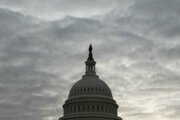THANYARAT DOKSONE
Associated Press
BANGKOK (AP) — Thailand’s Election Commission said Thursday it is “highly unlikely” that the country will be able to hold July elections due to political unrest that has disrupted preparations. The turmoil was highlighted by protesters who forced the acting prime minister to flee a key poll-planning meeting and overnight violence that left three dead.
The attack on a protest site, in which at least 22 others were injured, prompted a televised announcement by the army chief, Gen. Prayuth Chan-ocha, that the military might have to “use force” if violence continues. The comment repeated earlier warnings from Prayuth since the political crisis escalated six months ago.
Acting Prime Minister Niwattumrong Boonsongpaisan was meeting Thursday with the Election Commission at an air force academy outside Bangkok to discuss whether the controversial polls could be held July 20 or would have to be delayed due to the political conflict. He had chosen the location for security reasons to avoid protesters in the capital who are opposed to the election and are calling for an unelected, appointed prime minister.
About 100 protesters who had driven in motorcades from central Bangkok entered the compound through a side entrance, blowing whistles and waving Thai flags. Riot police stationed outside apparently allowed them to enter, followed by protest leader Suthep Thaugsuban.
Niwattumrong and several Cabinet ministers at the meeting were notified by security officers that protesters were approaching and hastily ended the meeting, got into their cars and were driven away.
“The government side agreed that we should leave for our own safety,” said Lt. Gen. Paradorn Pattanathabutr, a senior government official who attended the meeting. “The protesters wanted to get in, so we had to leave in our vehicles immediately.”
He said the government has suggested that future meetings be held by teleconference.
After the commotion ended, Election Commissioner Somchai Srisuthiyakorn cast doubt on the likelihood of an election taking place July 20 — a date the commission had selected but still requires a royal endorsement to become official.
“It looks like it will be impossible for the general election to take place on July 20,” he said in a telephone interview. According to a strict timetable, the decree must be issued by May 22 for the election to occur on July 20.
But a number of issues need to be sorted out between the government and Election Commission before the royal decree is issued, said Somchai, who is known to support the protesters. “Looking at this timeframe, it is highly unlikely that it will happen in time.”
If the July date doesn’t work out, it could be delayed by a few weeks or longer, said the commission’s secretary-general, Puchong Nutrawong.
Thailand’s long-running political crisis deepened last week when the Constitutional Court removed Prime Minister Yingluck Shinawatra for nepotism along with nine Cabinet members in a case that many viewed as politically motivated. Protesters say Yingluck’s removal is not enough, though. She was simply replaced by Niwattumrong, who was a deputy premier from the ruling party.
The protesters are pushing the Senate and the nation’s courts to intervene in the crisis to install a “neutral” prime minister, but the government says that is a threat to the nation’s democratic system and would be tantamount to a judicial coup.
Yingluck’s party would almost certainly win another election because of its widespread support among the rural poor, and protesters are opposed to polls without political reforms implemented first. They want to set up an unelected “people’s council” to implement still-undefined changes to completely remove Yingluck’s family influence from politics.
The pre-dawn attacks near Bangkok’s Democracy Monument, where some protesters are camping out, was the latest violence to hit the capital since protesters launched a campaign to oust the government six months ago.
Police Col. Krailert Buakaew said at least three grenades were detonated and machine guns were fired at protesters in the small encampment. He said the dead included a sleeping protester and a volunteer guard. He said investigators are collecting evidence but have so far found only puddles of blood at the scene.
The Erawan Medical Center, which tracks casualties, said that the toll was three dead and at least 21 wounded.
The attack brings the toll since protests began last November to 28 dead and about 800 wounded.
Thailand’s political crisis began in 2006, when Yingluck’s brother, former Prime Minister Thaksin Shinawatra, was toppled by a military coup after being accused of corruption, abuse of power and disrespect for King Bhumibol Adulyadej.
Thaksin, a former telecommunications billionaire, remains highly popular among the poor in Thailand’s north and northeast, and parties controlled by him have won every national election since 2001. The anti-government protesters, aligned with the opposition Democrat Party and backed by the country’s traditional elites, say they want to remove all traces of his political machine from politics.
___
Associated Press writers Jocelyn Gecker and Todd Pitman contributed to this report.
Copyright 2014 The Associated Press. All rights reserved. This material may not be published, broadcast, rewritten or redistributed.







